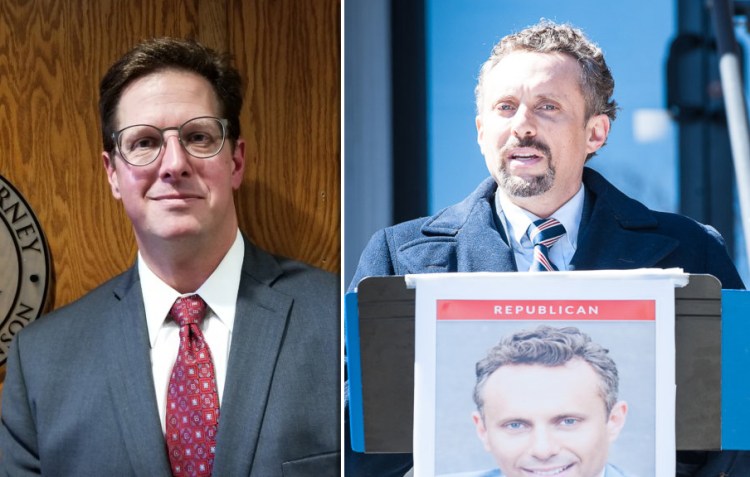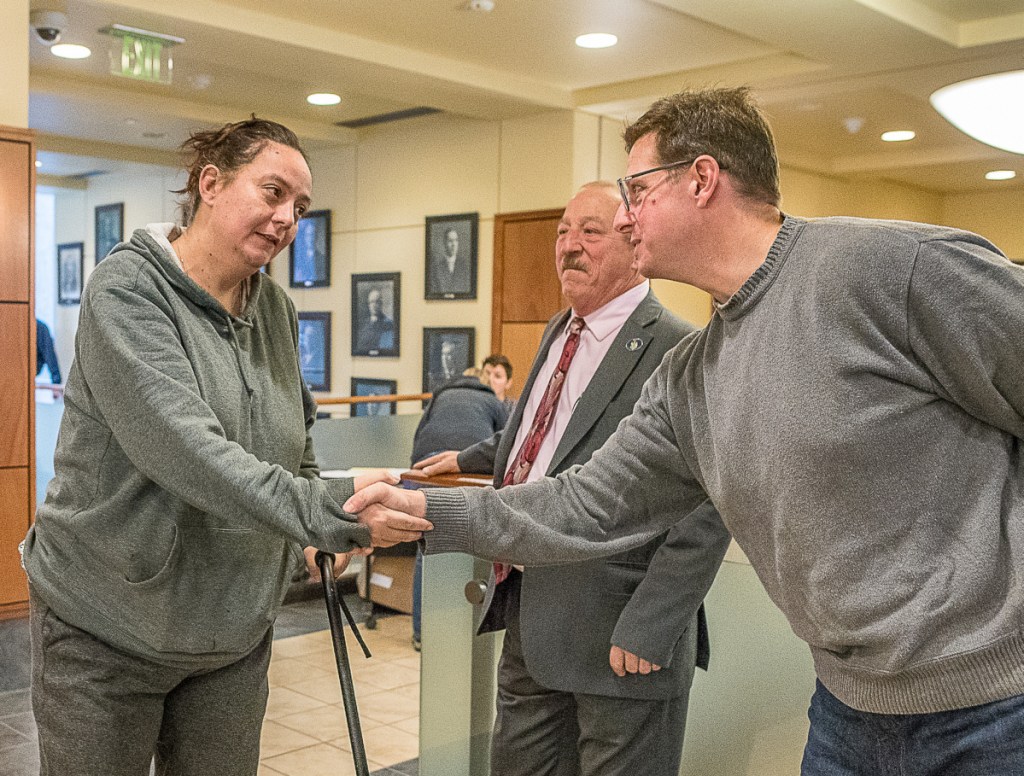AUBURN — A robocall campaign Tuesday paid for by a Nevada man targeted District Attorney Andrew Robinson with allegations of unethical activity that the prosecutor said are not true.
Robinson said Tuesday morning he was frustrated there was no easy way to respond to the robocalls that have smeared him to many voters in Androscoggin, Franklin and Oxford counties, just as voters headed to the polls to decide the district attorney race.
Every allegation raised in the calls is untrue, Robinson said.
The caller on the robocall identified himself as Kevin Grundy, a former Farmington man convicted of stalking in 2006, according to Robinson.
Grundy said that regardless of what happens at the polls, he plans to “keep going after” Robinson until the prosecutor is driven from office one way or another.
“I’m not going away,” said Grundy, who lives in Las Vegas.
According to court records, in July 2005 Grundy was charged with stalking and harassment in Farmington. In the robocall, Grundy accused Robinson of falsely charging him for personal interests.
According to court records, the following year Grundy was found guilty of misdemeanor stalking by a jury and sentenced to serve 100 days in jail, with all but three days suspended. He was fined $1,500. Robinson said he was the prosecutor in the case.
In 2005, a Franklin County court issued two separate protection-from-abuse orders against Grundy, barring him from contact with his former wife and another person. He also was fined $1,000 in connection with the orders. He later was charged with violating one of those orders.
Grundy said the case involved a web of people who included Robinson, which he intends to highlight as he exposes what he insists are misdeeds by the prosecutor.
Republican challenger Seth Carey has sent messages to voters via their cellphones in the last hours of the campaign as well. They also contained some of the same unproven allegations.
At the polls Tuesday, Carey said that “when government officials abuse their power and falsely charge people with crimes, this happens, and it should. Sometimes you pick on the wrong person, and he has power, too.”
One of the charges made by Carey in his calls to voters was that Lewiston police Chief Brian O’Malley has blamed Robinson for an alleged increase in violent crime.
O’Malley denied the allegation Tuesday, said he never talked with Carey about the issue, and confronted Carey about the claims Tuesday at Longley Elementary School in Lewiston as voters went in and out of the polling place.
O’Malley said he introduced himself to Carey, “as he had no idea who I was. I advised him that I have never spoken with him about violent crime or that the current D.A. was the cause of the increase of violent crime.”
O’Malley said Carey told him he’d heard the chief had made the charge. O’Malley again denied saying it.
“I have known D.A. Robinson for over 15 years and I have found him to be a hardworking, level-headed prosecutor,” O’Malley said.
“Under his proven direction and leadership, his office works hard to further public safety in our community. D.A. Robinson is approachable and has worked hard to modernize his office,” the chief said.
O’Malley said that because of his position, he does not get involved in politics, “but I was taken aback when I learned of Carey’s robocalls and text messages.”
Grundy, who insisted he has no connection to Carey or his campaign, tried to take out a political advertisement in the Sun Journal that made some of the same charges, but the paper refused to publish it.
In a note to the newspaper, Grundy said Robinson “is bad news and with or without the support of the Sun Journal I am going to expose him for the sneaky and dirty guy that he is.”
Robinson, standing at the polls shaking hands with voters, said he contacted the Sun Journal because “I don’t have another forum to address it” in a timely way.
Robinson has been engaged in a re-election fight with Carey, whose law license has been suspended and who faces possible loss of his ability to practice law as early as next week, when he is scheduled for a judicial hearing on possible sanctions for unprofessional conduct.
The robocaller told voters to vote against Robinson.
Robocalls have become a common political tactic, with recordings, normally by prominent people or politicians, played to whoever answers a phone in a particular area.
Send questions/comments to the editors.




Success. Please wait for the page to reload. If the page does not reload within 5 seconds, please refresh the page.
Enter your email and password to access comments.
Hi, to comment on stories you must . This profile is in addition to your subscription and website login.
Already have a commenting profile? .
Invalid username/password.
Please check your email to confirm and complete your registration.
Only subscribers are eligible to post comments. Please subscribe or login first for digital access. Here’s why.
Use the form below to reset your password. When you've submitted your account email, we will send an email with a reset code.